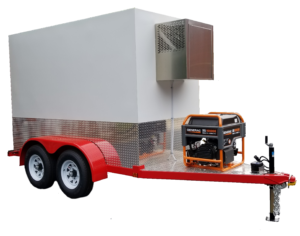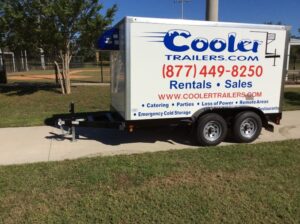The Facts About Cooler Trailers - Small Refrigerated Trailers And Freezer Trailer Revealed
Wiki Article
7 Simple Techniques For Cooler Trailers - Small Refrigerated Trailers And Freezer Trailer
Table of ContentsSome Of Cooler Trailers - Small Refrigerated Trailers And Freezer TrailerAn Unbiased View of Cooler Trailers - Small Refrigerated Trailers And Freezer TrailerNot known Facts About Cooler Trailers - Small Refrigerated Trailers And Freezer TrailerThe smart Trick of Cooler Trailers - Small Refrigerated Trailers And Freezer Trailer That Nobody is Talking AboutThe Basic Principles Of Cooler Trailers - Small Refrigerated Trailers And Freezer Trailer
Some trailers have multiple temperature level areas, enabling different kinds of cargo to be carried within the exact same reefer. There are a number of different types of reefer containers - https://moz.com/community/q/user/coo1ertrailer. Unlike dry vans, which can have wall surfaces, ceilings, and floors constructed from wood, reefers are typically made from metal or fiberglass to enhance insulationThese reefer containers are protected to manage temperature level control. These are the most innovative kinds of reefer trailers.
They do this by collecting and eliminating warm from the inside of the trailer. Cooled trailers use three core parts for their cooling system:.
As the cooling agent passes via this valve, it comes to be a trendy liquid. As soon as in the evaporator, the fluid expands and becomes a warm gas again, absorbing the heat and air from inside the container. This gas obtains drawn into the compressor, beginning the cycle over once more. These parts cause variants in atmospheric pressure to develop air flow.
Cooler Trailers - Small Refrigerated Trailers And Freezer Trailer Can Be Fun For Anyone

A chilled or 'reefer' trailer has a refrigeration system at the front which can warm or cool down the tons depending on the ambient temperature. It allows for temperature-sensitive products to be transported long ranges. In some components of Australia, temperature levels can range from freezing factor to +40 Celsius in a matter of a couple of hours.

In these pull trailers, the fridge unit gets on the front, but they can be recessed right into the leading and even beneath, particularly if it's a b-train rear trailer The wall surfaces of the vehicle or trailer will either be a box body or an insulated drape ('curtainsider'). Insulated curtains enable packing from either side of the truck or trailer along the entire size, as well as the rear, but the drapes can be challenging to work with, particularly if it's windy.
Cooler Trailers - Small Refrigerated Trailers And Freezer Trailer Fundamentals Explained
All heaps ought to coincide height and it's ideal to make use of the entire floor location (cooler trailer). Aluminium floor with networks Where a partial load is being delivered, or where the trailer sustains twin temperature levels, thick bungs can be made use of. This is much more effective as the room that must be cooled is smallerChillers might need to be aired vent occasionally when transferring items that provide off carbon dioxide as they ripen, depending on the directions provided by the consignor. High quality door seals are excellent for insulation If you require one for your company, right here's how to have a look at a reefer truck or trailer.
This makes it an essential part of the supply chain for perishable goods. The refrigeration system in the trailer can be powered by diesel engines or electrical motors powered by onboard generators or from the truck, or coast power and the temperature can be adjusted remotely from outside the trailer.
Large is 24' to 53' and is a sort of semi-trailer drew with a tractor that has a 5th wheel (cooler trailer). Cooled trailers can be utilized for brief or long-haul transport and are frequently utilized by food suppliers, distributors, and sellers to move products between production websites, storage facilities, and retail areas
Cooler Trailers - Small Refrigerated Trailers And Freezer Trailer Things To Know Before You Get This
But what does "reefer" stand for? A chilled or "reefer" trailer is a heavily insulated and firmly sealed container that has a Trailer Refrigeration Device (TRU) installed on the outside of the front wall surface, to manage the temperature inside the trailer. The primary function of a reefer trailer is to keep the temperature of products at the time it is filled.As an example, gelato is loaded icy and the TRU keeps it frozen throughout transportation to make sure that it is still frozen when it shows up at its location. Managing a trailer's temperature in this means assists keep the high quality and prolong the life span of the freight being transported. Reefer trailers are the same size as an average semi-trailer, indicating that they are basically 53-foot-long refrigerators on wheels

In between the much heavier building products and refrigeration unit, refrigerated trailers are much heavier. The optimum loadable weight for a 53' cooled trailer is 43,500 lbs. Trailers are normally newer. Refrigeration units stress this contact form out after a couple of years of constant work, and carriers typically need to change trailers every 3 to five years.
The 9-Minute Rule for Cooler Trailers - Small Refrigerated Trailers And Freezer Trailer
As air from inside the trailer passes over the evaporator coil, it eliminates warmth and rearranges the currently colder air back throughout the trailer. There are two various methods to run the refrigeration unit cycle or constant. Running the refrigeration system in cycles lowers diesel consumption, however additionally develops even more temperature variation.Report this wiki page